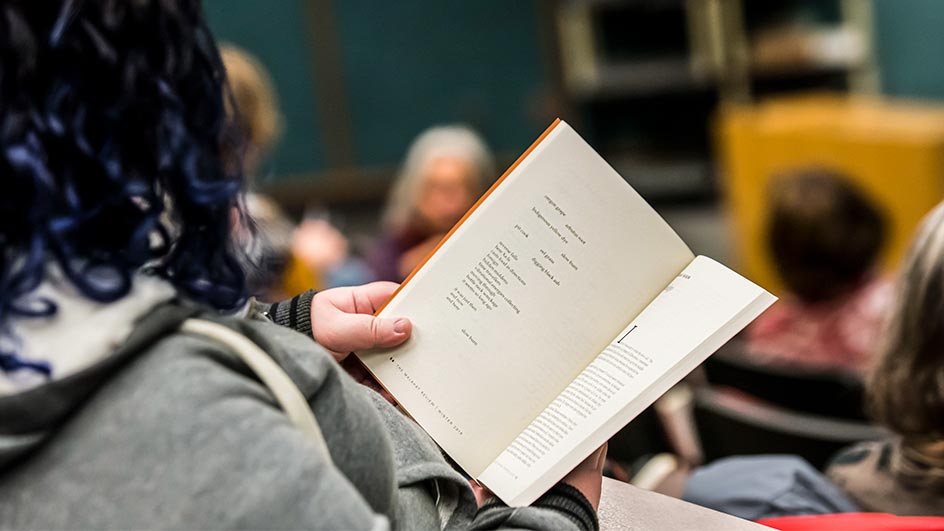Meet the undergraduate students who placed first with their writing on equity, diversity, and human rights

Photo via the University of Victoria.
The University of Victoria’s annual on the Verge writing contest, facilitated by UVic Libraries and Equity & Human Rights UVic, has come and gone once again. First and second place and honourable mention prizes have been awarded to 11 undergraduate writers.
The first place winners — Tessa Thevenot, Cate Freeborn, Saule Olson, and Hannah Brown, who won in the fiction, poetry, non-fiction, and spoken word categories respectively — sat down with the Martlet to talk inspiration, process, and what this win means for a young writer. Congratulations also to Eli Pazder, Parris Mook-Sang-Forbes, Nico Caparas, Rita Bunrayong, El Newell, Alex Da Matta, and Ruby Harris whose works either took second or placed as honourable mentions in the contest.
The theme of on the Verge 2024 was equity, diversity, and human rights. Winning submissions, chosen by guest judge Thembelihle Moyo, interpreted the theme in myriad ways. Their works consider ecological equity; freedom and belonging in one’s cultural heritage; empowerment within one’s own gender, sexuality, and neurodivergence; colonial legacies; and reclamations of identity.
Tessa Thevenot, first place in fiction
Thevenot’s “Red Cedar Confessionals of the Rich Man’s Sport” looks at the impact that climate change has on fish size, through one conversation between a bartender and patron at a fishing lodge. According to Thevenot, it’s based on conversations she has had herself.
“It’s a bit dystopian, but it’s based in fact,” she says.
Thevenot spent a summer working in a lodge in Haida Gwaii — a location that remained at the top of her mind while she was writing her submission.
The short story is actually a restructuring of the opening chapter of her novel-in-progress. By working so closely with a single chapter during the contest submission process, Thevenot realized what work remained on the rest of her novel.
Thevenot hopes to bring attention to the ways people respond to the environment and what our ecological future may look like. “I really hope that my short story opens up some eyes to that,” Thevenot says.
Cate Freeborn, first place in poetry
Freeborn won first place in the contest’s poetry category with a freeform poem called “At 19, I am diagnosed with autism spectrum disorder”. A version of the poem, Freeborn says, was originally written almost two years ago, following her initial diagnosis. When she saw the contest’s theme, she picked it up again, revised it from her current retrospective standpoint, and submitted it.
The poem wrestles with the experience of neurodivergence and trauma, wondering, in some respect, what one is to do with the cards they have been dealt.
“I was trying to write a poem specifically about autism to encapsulate my experience,” says Freeborn.
When she was diagnosed with autism, Freeborn could find very little media representing experiences similar to her own, so this piece is also a brick in the wall, so to speak, working to fill what she identifies as a “gap in literature”.
Saule Olson, first place in non-fiction
Saule Olson’s “Resuscitating myself” is a short work of non-fiction about freedom, belonging, and identity. The piece considers the weight of a name, a place to call home, and a cultural heritage through the author’s exploration of her own experience as a Kazakh-Canadian.
Writing is a form of release or freedom for Olson, but she also sees it as a way of stepping into power. In the past, Olson shares, she has let other people speak into her identity before she spoke into her own cultural roots as Kazakh. She says that this piece of writing was an act of reclamation.
After winning the contest, Olson says she realized, “I am powerful with my words.”
For Olson, writing is putting structure to ephemerality and chaos, and the fun of it is finding decolonial and authentic writing practices to accurately mirror her lived experiences.
“I like to write into the silences that I’ve lived in,” Olson says, adding that this piece of writing was a freeing experience, and she hopes that this work resonated with or inspired its readers too.
Hannah Brown, first place in spoken word
“I am me,” Brown’s winning spoken word submission, considers various seen and unseen aspects of identity that create the self. The work was inspired by conversations Brown was having with those around them about identity and privilege. The juxtaposition of their marginalized identities — to do with their disability, queerness, and sexuality — and their whiteness and visible privilege creates what Brown calls a “liminal space of marginalization.”
Their main work is as an advocate for accessibility and within the 2SLGBTQIA+ community. Before the contest, Brown says, they never thought they were a creative person.
“Spoken word is quite new to me,” says Brown. “[I thought] I might as well put it out there and see if it resonates with other folks,”
Now though, they are looking forward to exploring new — possibly creative, less traditional, and decolonial — avenues for communicating around accessibility and advocacy.
The winners, across every category, expressed that their success was encouraging and affirming, and to future potential entrants they have equally heartening things to say.
“Don’t hesitate,” says Thevenot.
Brown adds, “If you never try, you’ll never know. And you might surprise yourself with what you’re capable of.”







